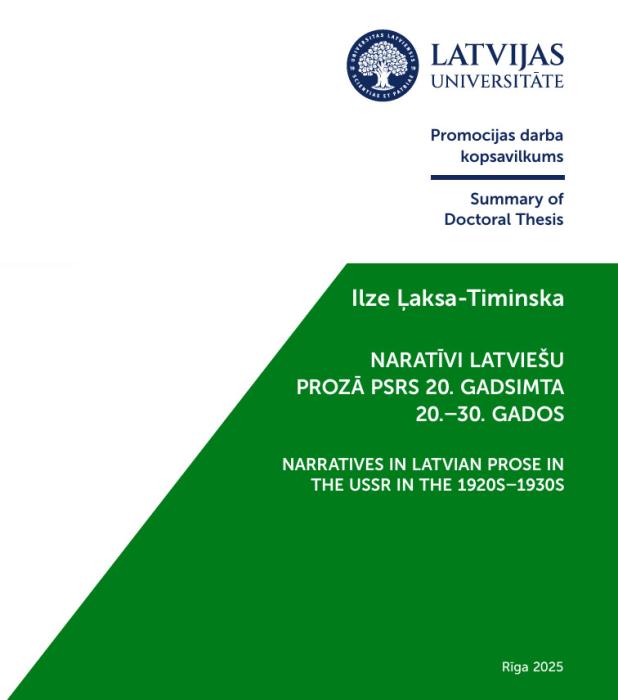Ilze Ļaksa-Timinska to Defend Her Doctoral Thesis

On March 11, 2025, at 14:00, an open session of the Promotion Council for Linguistics and Literary Studies and for Music, Visual Arts, and Architecture will take place at the Faculty of Humanities, University of Latvia (Visvalža Street 4a, Room 402, Riga).
During the session, Ilze Ļaksa-Timinska, researcher at the Institute of Literature, Folklore and Art (ILFA), University of Latvia, will defend her doctoral thesis for the degree of Doctor of Science (Ph.D.) in the Humanities and Arts.
Thesis title: “Narratives in Latvian Prose in the USSR during the 1920s–1930s”
Supervisor: Professor Dr. philol. Ieva Kalniņa
Reviewers:
-
Professor Dr. philol. Ausma Cimdiņa (University of Latvia)
-
Professor Dr. philol. Maija Burima (Daugavpils University)
-
Professor Dr. philol. Zanda Gūtmane (RTU Liepāja Academy)
The thesis is available for consultation at the Multidisciplinary Library of the University of Latvia and in Room 304 of the Faculty of Humanities.
Abstract:
This dissertation focuses on a little-studied subject: the Latvian diaspora in the USSR during the 1920s–1930s, with particular attention to prose texts published by Soviet Latvians during that period. The aim of the study is to identify and analyze the literary narratives of this diaspora, their diversity, underlying ideologies, and how they contribute to an understanding of cultural identity within this historical context.
The thesis is structured in four chapters: the first two develop the theoretical framework and historical context, while the latter two present empirical analysis. The theoretical foundation draws on New Historicism, Fredric Jameson’s approaches to literary history, as well as imagology, feminist, and postcolonial theory.
The empirical part includes analysis of short prose, with a focus on the representation of female characters and interpretations of historical events. Novels are analyzed through the lens of socialist realism. The study also integrates archival documents and historical materials.
This is the first comprehensive scholarly work to examine the literary process and texts of the Latvian diaspora in the USSR during the 1920s–1930s. Its critical, depersonalized approach, free of political bias, allows for a deeper understanding of the narratives, ideas, and identities reflected in this unique literary heritage.